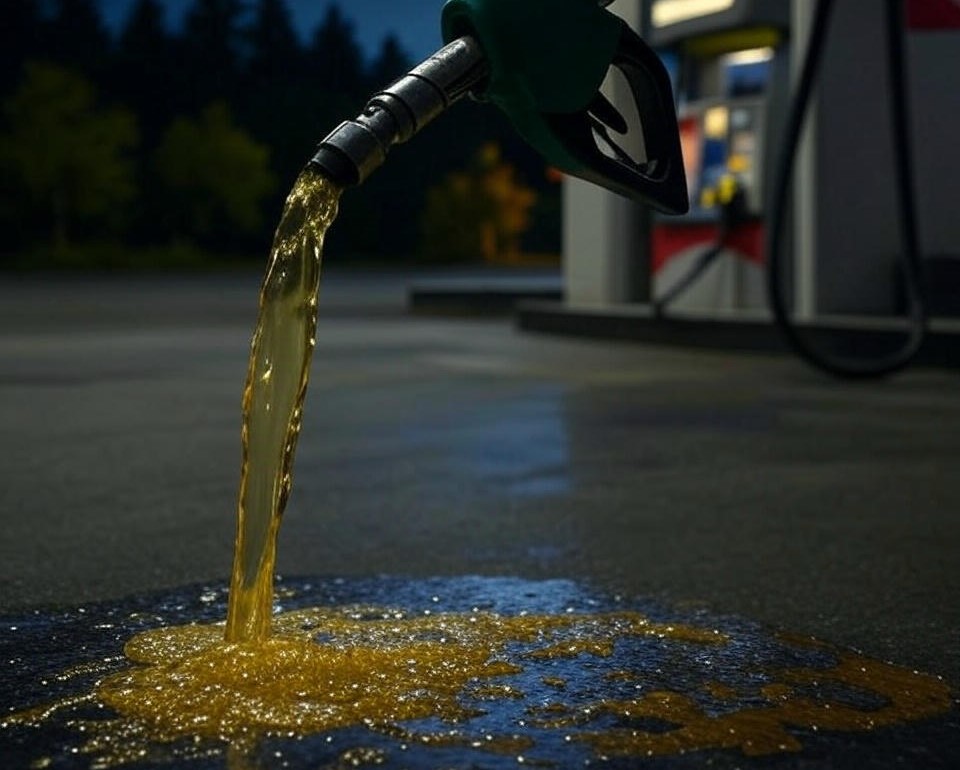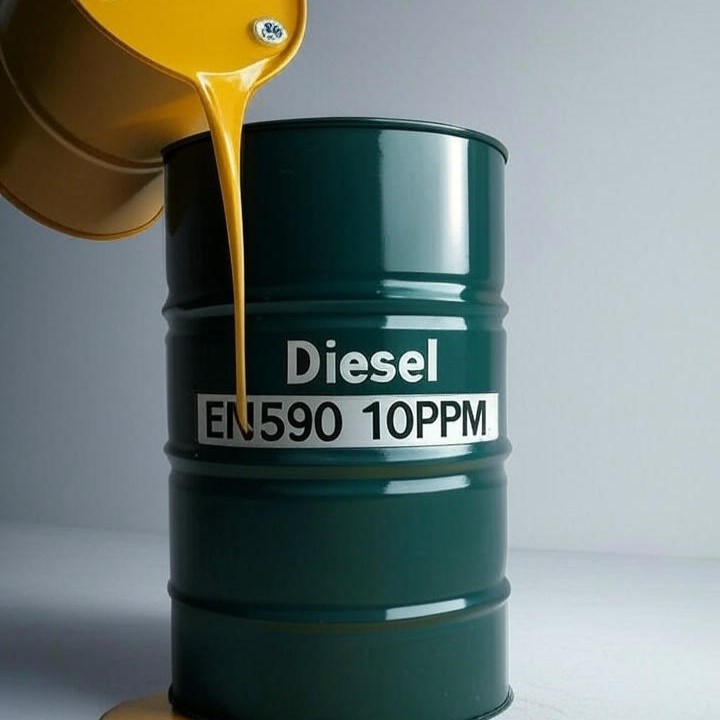What Makes Diesel EN590 10PPM Unique?
Diesel EN590 10PPM stands as a meticulously calibrated formulation, crafted to comply with the rigor of European fuel ordinances. Engineered with an infinitesimal sulfur quotient—precisely 10 particles per million—it signifies a pivotal evolution in the continuum of diesel refinement. This alchemy sharply diminishes the toxic effluvia traditionally exhaled by antiquated diesel variants.
With its molecular precision, this fuel—produced by iranpetroexport—empowers contemporary combustion systems to operate with heightened purity and mechanical eloquence, all while effortlessly navigating the labyrinth of transnational ecological statutes.
By using Diesel EN590 10PPM, vehicle owners benefit from smoother engine operation, enhanced durability of fuel systems, and fewer maintenance issues. The fuel's composition also supports advanced exhaust after-treatment systems, including diesel particulate filters and selective catalytic reduction systems, ensuring full compliance with Euro 4, 5, and 6 standards.
How 10PPM Sulfur Improves Emission Control
Low sulfur diesel plays a vital role in reducing environmental impact. The reduced sulfur content means that fewer sulfur dioxide particles are emitted into the atmosphere. This cleaner burn is not just better for the environment but also supports critical engine systems designed to manage emissions.
- Cleaner Combustion
- Extended Filter Life
- Lower Maintenance Costs
- Enhanced Engine Performance
Cleaner Combustion
Trimming sulfur to negligible levels refines the combustion cycle, allowing it to burn with sharper precision and minimal residue. The outcome? Noticeably less smoke and a stark decline in particulate discharge. This purer ignition rhythm grants diesel engines a more harmonious fuel-to-air alignment, which in turn nurtures mechanical longevity and steadier performance across the board.
Extended Filter Life
Elevated sulfur concentrations are notorious for suffocating diesel particulate filters (DPFs), leading to premature clogging and functional decline. Diesel EN590 10PPM, with its ultra-clean composition, acts as a safeguard—prolonging DPF vitality by minimizing soot accumulation. The result is a filtration system that breathes easier, demanding fewer regeneration cycles and staving off costly replacements. In essence, it stretches service intervals and trims down maintenance expenses significantly.
Lower Maintenance Costs
Sulfur buildup can damage fuel injectors, turbochargers, and exhaust systems. Using ultra-low sulfur diesel minimizes such risks. Over time, this leads to fewer breakdowns and reduced repair expenses—especially important for commercial fleets where uptime is crucial.
Enhanced Engine Performance
Sulfur can restrict the movement of engine components and reduce fuel oil flow efficiency. EN590 10PPM improves ignition quality, supports better combustion timing, and enhances throttle response. Drivers notice smoother rides and stronger torque output.
Fuel Efficiency and Cost Savings Explained
Fuel economy is a priority for both private and commercial users. Diesel EN590 10PPM delivers more miles per gallon due to its cleaner burning properties. When engines operate efficiently, they use less fuel to achieve the same power output.
Fleets that switch to EN590 10PPM often report measurable drops in fuel consumption compared to heavier fuels like Fuel Oil Mazut M100. Lower fuel usage not only reduces operational costs but also extends the life of fuel injectors and other components. Even small improvements in MPG can save thousands over a year, especially for vehicles that operate daily.
Additionally, fewer emissions mean fewer penalties and taxes in regions with strict environmental regulations. That’s another layer of savings for businesses and operators using this fuel.
Diesel EN590 10PPM vs. Regular Diesel
There’s a significant difference between EN590 10PPM and standard diesel fuel. Traditional diesel often contains much higher sulfur levels—up to 500 PPM in some cases. That added sulfur produces more pollution, harms engine components, and requires more frequent filter replacements.
Diesel EN590 10PPM, by contrast, is refined with advanced technologies that remove impurities and meet eco-friendly benchmarks. It’s the preferred option for diesel vehicles equipped with emission-reducing technology. For users who want long-term engine health and compliance with green energy standards, EN590 10PPM is a smart and responsible choice.

Compatibility With Euro 4, 5, and 6 Engines
Today’s diesel engines are more sophisticated than ever. Most models built to meet Euro 4, 5, or 6 standards require fuels with extremely low sulfur content. Diesel EN590 10PPM is precisely designed for these engines. It supports their advanced emissions systems and helps ensure that they function as intended. This high-quality diesel is often refined from blends such as Export Blend Crude Oil REBCO, known for its optimal properties that meet stringent environmental and performance standards.
Using higher sulfur fuels in such engines may void warranties, damage sensitive parts, and even lead to legal non-compliance in certain regions. With EN590 10PPM, you avoid those risks while keeping your vehicle running efficiently.
Moreover, using the correct fuel for these engines maximizes performance. It ensures optimal combustion, reduces idle time, and improves reliability—essential features for both city drivers and long-haul operators.
Is Diesel EN590 10PPM Good for Your Engine?
Yes—Diesel EN590 10PPM is one of the best choices for diesel engines today. It offers a cleaner, smoother burn, and keeps engine components in better shape for longer. It’s especially beneficial for vehicles operating in urban areas where stop-and-go driving demands optimal engine health.
The fuel’s ultra-low sulfur content prevents deposits that commonly lead to reduced engine efficiency. It also preserves the functionality of emission systems. Over time, this reduces the frequency of costly breakdowns, improving the overall life span of your vehicle.
Engineers recommend Diesel EN590 10PPM for its consistent performance. Whether your diesel engine powers a car, truck, or industrial machine, this fuel delivers reliable and efficient operation.
Storage Tips for Diesel EN590 10PPM
Preserving the integrity of Diesel EN590 10PPM demands more than routine handling—it calls for deliberate safeguarding. The fuel must rest in impeccably clean, hermetically sealed containers crafted from materials that won’t react adversely over time. Any flirtation with ambient air or rogue moisture invites degradation, corrosion, and subpar engine behavior.
- Storage tanks should undergo vigilant scrutiny—searching for rust’s creep, water’s intrusion, or the stealth of subtle
- Stowing diesel for more than half a year? Not without stabilizing additives—it’s a gamble otherwise
- Clean fuel isn’t just a virtue; it’s a prerequisite for efficient combustion, and the way it's stored tips the balance
- Operators would do well to cycle through their diesel reserves and employ advanced filtration systems during transfers. These seemingly small rituals are what stand between peak engine function and costly breakdowns

Where to Find High-Quality Diesel EN590 10PPM
Diesel EN590 10PPM is widely available in most countries that follow European fuel standards. Look for reputable fuel suppliers or commercial refueling stations that specifically mention “EN590” or “10PPM sulfur” on their labels.
Many online fuel marketplaces now offer delivery services for bulk buyers. Always verify product certifications to ensure compliance with EN590 standards. It’s also a good idea to test fuel quality before large-scale usage, especially in sensitive or high-performance engines. For some applications, alternative fuels like Liquefied Petroleum Gas (LPG) are considered, but Diesel EN590 10PPM remains a top choice for diesel engines requiring low sulfur content.
Partnering with trusted distributors ensures you get fuel that meets performance and regulatory expectations.
Environmental Impact of Using Ultra-Low Sulfur Diesel
Opting for Diesel EN590 10PPM isn't just an upgrade—it's a deliberate move toward a cleaner, healthier atmosphere. This ultra-low sulfur fuel brings both ecological and ethical gains to the table.
- Reduced Airborne Pollutants
- Government-Endorsed Fuel Standards
- Climate-Conscious Fuel Choice
- A Blend of Efficiency and Ethics
Reduced Airborne Pollutants
- Emissions carry less sulfur dioxide into populated areas
- Particulate matter levels in the air drop dramatically
- Smog formation is minimized in dense traffic zones
- Public respiratory health sees measurable improvements
Government-Endorsed Fuel Standards
- Regulatory bodies worldwide support EN590 10PPM adoption
- Some nations provide incentives for early transitions
- Usage aligns with international emissions protocols
- Compliance avoids penalties and regulatory pressure
Climate-Conscious Fuel Choice
- Lower sulfur fuels cut greenhouse gas outputs
- Sustainable options like EN590 10PPM slow climate drift
- Environmental goals are more easily achieved
- Fuel choice reflects commitment to global stewardship
A Blend of Efficiency and Ethics
- Clean fuel supports optimized engine longevity
- Ethical operation aligns with green business models
- Cleaner combustion reduces maintenance costs
- Responsible choices boost brand reputation
Conclusion
Diesel EN590 10PPM is more than just fuel—it’s a cleaner, smarter solution for today’s diesel engines. With its ultra-low sulfur content, it improves combustion, extends engine life, and reduces harmful emissions. Whether you're a private driver or manage a large fleet, this fuel ensures better performance, lower costs, and environmental compliance. Make the switch to Diesel EN590 10PPM and drive cleaner, longer, and smarter.
